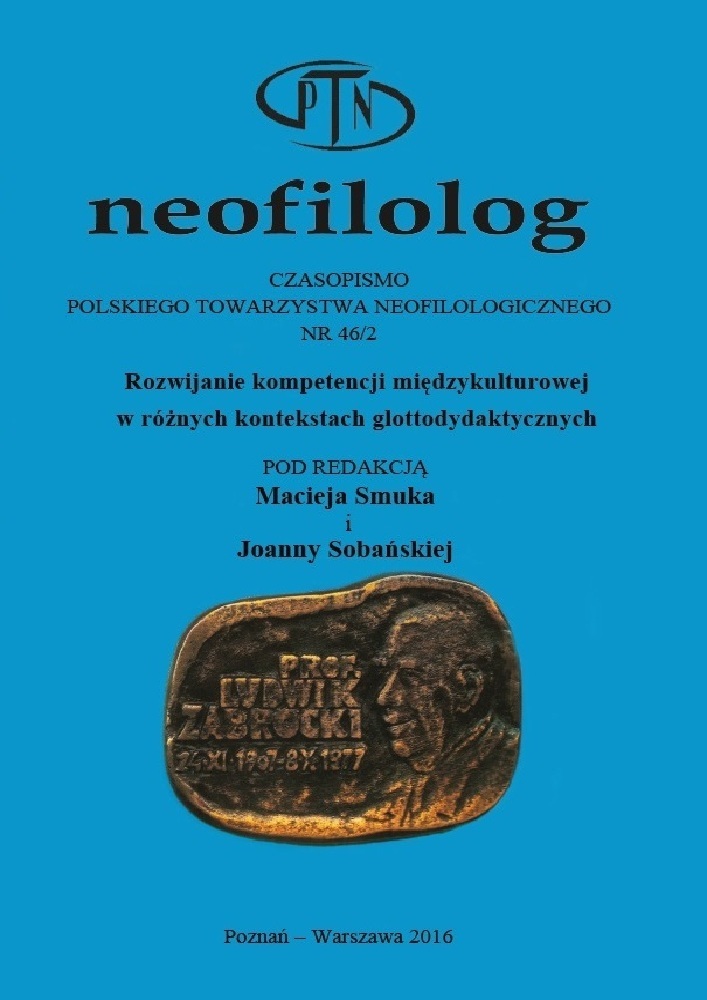Abstract
The supporters of the concept of multilingualism and interculturalism emphasize that learning new languages is more effective when one con-sciously refers to the past and current experiences in the exploration and use of languages. A person who, in addition to the mother tongue, learned a foreign language and knows how to use it, not only possesses a skill set needed in the process of learning but also has the information about a language system. Referring to the available research on multilin-gualism, this article outlines the methods of utilizing this potential dur-ing foreign language classes and of preparing the ground for a complex program of teaching additional languages.References
Brohy, C. 2008. „Didactique intégrée des langues: évolution et définitions”. Babylonia, 1: 9-11.
Candelier, M., Camillieri-Grima A., Castellotti, V., De Pietro, J.-F., Lörincz, I., Meißner, F.-J., Noguerol, A., Schröder-Sura, A. i M. Molinié. 2007. FREPA. Framework of refer-ence for pluralistic approaches to languages and cultures. Strasbourg: Council of Europe, Graz: ECML.
Candelier, M. i A. Schröder-Sura. 2012. „Wspieranie rozwoju kompetencji różnojęzycznych i międzykulturowych w klasie szkolnej”. Języki Obce w Szkole, 4: 4-11.
Egli Cuenat, M. 2012. „Création de matériaux d’enseignement pour un apprentissage coordonné des langues?”. Babylonia, 1: 22-28.
Hufeisen, B. i G. Neuner. 2004. Le concept de plurilinguisme: Apprentissage d’une langue tertiaire-l’allemand après l’anglais. Strasburg: CELV, Conseil de l’Europe.
Manno, G. i C. Greminger Schibli. 2015: „Les synergies offertes par la didactique inté-grée des langues – profitons-en dans l’enseignement du français deuxième langue étrangère!”. (w) Weiterbildung und Mehrsprachigkeit – Formation con-tinue et plurilinguisme – Further education and plurilingualism. (red. M. Weil i M. Vanotti). Bern: Hep-Verlag, str. 46-63.
Moore, D. 2006. Plurilinguismes et école. Paryż: LAL Didier.
Roulet, E.1995. „Peut-on intégrer l’enseignement-apprentissage décalé de plusieurs langues ?”. Babylonia, 2: 22-25.
Widła, H. 2007. L’acquisition du français – langue troisième.
Problèmes méthodolo-giques et implications pratiques. Katowice: Wydawnictwo Uniwersytetu Śląskiego.
Widła, H. 2009. Ćwiczenia z języka francuskiego (na płycie CD). Katowice: Wydawnictwo Uniwersytetu Śląskiego.
Widła, H. 2011. „Skuteczność nauczania drugiego języka obcego – próba zastosowania wyników badań w praktyce”. Lingwistyka stosowana, 4: 53-67.
Wokusch, S. 2008. „Didactique intégrée des langues (étrangères) à l’école: vers l’enseignement des langues de demain”. Prismes Revue Pédagogique HEP, 8: 30-34.
Zarate, G., Lévy, D. i C. Kramsch. 2008. Précis du plurilinguisme et du pluriculturalisme. Paryż: Editions des archives contemporaines.
Netografia
Braunek, A. 2013. Powszechność nauczania języków obcych w roku szkolnym 2011-2012. Raport Ośrodka Rozwoju Edukacji. file:///C:/Users/GPS/Downloads/powszechnosc_nauczania_jezykow_2011_2012.pdf [DW 5.01.2016].
CIIP (Conférence intercantonale de l’instruction publique de la Suisse romande et du Tessin). 2003. Déclaration de la CIIP relative à la politique de l’enseignement des langues en Suisse romande du 30 janvier 2003. http://www.axl.cefan.ulaval.ca/europe/suisse-CIIPSRT-2003.htm [DW 05.01.2016].
GUS (Główny Urząd Statystyczny). 2014. Oświata i wychowanie w roku szkolnym 2013-2014. file:///C:/Users/GPS/Downloads/oswiata_i_wychowanie%20(1).pdf (DW 05.01.2016).
License
Copyright (c) 2018 Małgorzata Piotrowska-Skrzypek

This work is licensed under a Creative Commons Attribution-NoDerivatives 4.0 International License.
Authors
Authors of texts accepted for publication in Neofilolog are required to complete, sign and return to the Editorial team’s office the Agreement for granting a royalty-free license to works with a commitment to grant a CC sub-license.
Under the agreement, the authors of the texts published in Neofilolog grant Adam Mickiewicz University in Poznań a non-exclusive, royalty-free license and authorize the use of Attribution-NoDerivatives 4.0 International (CC BY-ND 4.0) Creative Commons sub-license.
The authors retain the right to the free disposal of the work.
Users
Interested Internet users are entitled to use works that have been published in Neofilolog since 2017, under the following conditions:
▪ attribution – obligation to provide, together with the distributed work, information about the authorship, title, source (link to the original work, DOI) and the license itself.
▪ no derivatives – the work must be preserved in its original form. Without the author's consent, it is not possible to distribute the modified work in the form of translations, publications, etc.
Copyrights are reserved for all texts published since 2017.
Miscellaneous
Adam Mickiewicz University in Poznań retains the property right as a whole (layout, graphic form, title, cover design, logo etc.).
